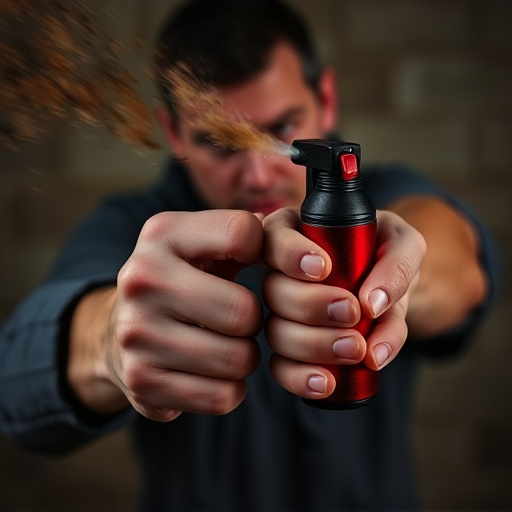Pepper spray, a popular civilian self-defense tool, uses capsaicin from chili peppers to temporarily disable attackers. Its effectiveness is influenced by distance, wind, and attacker's clothing. When considering pepper spray for personal protection, understanding its limitations and local laws regarding ownership and usage is crucial. Storing pepper spray safely in a car requires keeping it away from direct sunlight, extreme temperatures, and heat sources, while storing it in a secure, locked glove compartment or center console. Regular maintenance and training on targeted aiming and safe storage practices are essential for effective use and legal compliance regarding Pepper Spray Storage in Car.
In today’s world, citizens increasingly recognize the value of self-defense tools like pepper spray for personal protection. This compact and potent weapon offers a non-lethal means of deterring potential threats, making it a popular choice for civilians seeking to enhance their safety. This article guides you through essential aspects of defensive spray, including its composition, legal standing, storage in your vehicle, and effective usage techniques—all crucial knowledge for responsible civilian use.
- Understanding Pepper Spray: Its Composition and Effectiveness
- Legal Considerations for Civilian Use of Pepper Spray
- Storing Pepper Spray Safely in Your Vehicle
- Effective Usage Techniques and Training Recommendations
Understanding Pepper Spray: Its Composition and Effectiveness
Pepper spray, a popular self-defense tool for civilians, is designed to disable an attacker temporarily and allow users to escape or seek help. Its composition typically includes capsaicin, the active ingredient found in chili peppers, which irritates the eyes, nose, and respiratory system when inhaled. This irritation leads to temporary blindness, coughing, and difficulty breathing, giving the user precious time to get away safely.
When considering pepper spray for personal protection, especially during travel or storing it in your car (Pepper Spray Storage in Car), understanding its effectiveness is crucial. Pepper spray has proven to be highly successful in real-world scenarios, with studies showing that it can disable an attacker for several minutes. However, factors like distance, wind, and the attacker’s clothing can affect its performance. Therefore, users should also familiarize themselves with local laws regarding pepper spray ownership and usage to ensure responsible and legal employment of this powerful self-defense tool.
Legal Considerations for Civilian Use of Pepper Spray
The civilian use of pepper spray for self-defense is a topic that raises important legal considerations. In many jurisdictions, the possession and carrying of pepper spray are regulated, with specific rules regarding who can have it, where it can be carried, and how it can be used. For civilians considering pepper spray as a means of personal protection, understanding these laws is crucial to avoid any potential legal repercussions.
One key aspect is the legal distinction between self-defense and aggression. Pepper spray is generally considered a legal defense tool when used to protect oneself or others from imminent physical harm. However, its use for offensive purposes or in retaliation after an attack can lead to legal issues. Additionally, there are often restrictions on where pepper spray can be stored, especially in vehicles, to ensure it is not easily accessible to unauthorized individuals and to prevent misuse.
Storing Pepper Spray Safely in Your Vehicle
Storing pepper spray safely in your vehicle is crucial for ensuring its efficacy and preventing accidental discharge. Keep it out of direct sunlight, extreme heat, or cold, as these conditions can compromise the spray’s performance over time. Store it in a secure, locked glove compartment or center console—places that are easily accessible but not visible to prevent theft.
Ensure the storage area is well-ventilated to avoid buildup of harmful gases inside your vehicle. Never store pepper spray near heat sources, open flames, or other chemicals, as this can be dangerous and reduce the spray’s effectiveness. Regularly check the expiration date and condition of your pepper spray, replacing it promptly if necessary, for optimal protection while driving.
Effective Usage Techniques and Training Recommendations
Effective Usage Techniques and Training Recommendations
When it comes to defensive spray, proper usage is paramount. Citizens should be trained to aim for the eyes and face, as these areas are highly sensitive and a direct hit can temporarily incapacitate an assailant. A quick, thrusting motion is often more effective than a sweeping spray, allowing users to control the direction of the stream. Regular practice with simulated scenarios can greatly enhance reflexes and confidence in real-life situations.
Training should also emphasize safe storage practices, especially for Pepper Spray Storage in Car. Keeping defensive spray readily accessible yet secured from unauthorized use or accidental discharge is crucial. Many experts recommend storing it in an easily reachable glove compartment or center console, away from direct sunlight and extreme temperatures. Additionally, learning how to maintain and inspect the spray device regularly ensures its functionality when needed most.
Pepper spray, a powerful personal defense tool, offers civilians an effective means of deterring potential attackers. Understanding its composition, legal considerations, and proper storage, such as Pepper Spray Storage in Car, are essential for responsible use. Mastering effective usage techniques and undergoing appropriate training further ensures its reliability in critical situations. By following these guidelines, individuals can enhance their personal safety while navigating the legal framework surrounding civilian pepper spray use.
